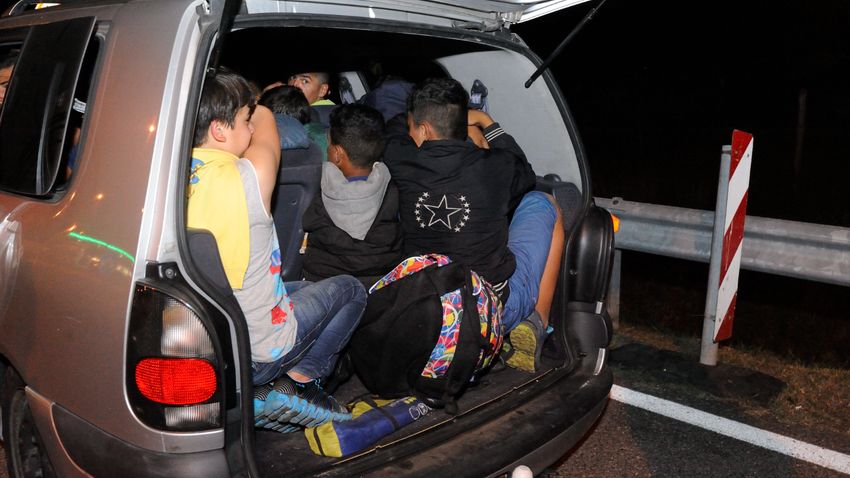You don't need to be an expert to determine that the sentences imposed on human traffickers, which have already been concluded and are legally binding, are quite light.
Violent acts are already taking place on the Hungarian border, and in the first month of the year, 6,444 border violators were caught, compared to 3,830 last year, György Bakondi, the Prime Minister's internal security adviser, told MTI a few days ago. On public television, he even added that violent acts are typically not committed by migrants, but by human traffickers.
On one occasion they tried to run over a Hungarian police patrol and on another occasion a national guard patrol, but the patrols opened fire. The most recent action took place in the area of the Szentpéterfa settlement in Vas county. On the Austrian side of the border, a clash broke out between people smugglers and Austrian border guards, and a 25-year-old Moldovan man was eventually captured, almost 20 kilometers from St. Peter's Square, in Körmend.
Last year the so-called Magyar Nemzet quoted from the Global Initiative Against Transnational Organized Crime report This revealed that the estimated value of migrant smuggling affecting our country in 2020 was 8.5 to 10.5 million euros. (We are talking about the tunnels in the area of Horgos, Szabadka, Zombor, Kelebia and the section of the Tisza closest to the Hungarian-Serbian-Romanian triple border.)
The report separates three types of smugglers present in the Western Balkans and calls them "fixers", "gatekeepers" and "travel organizers" based on their tasks. Fixers usually operate within the borders of one country; they can be taxi drivers, private individuals or truck drivers who transport migrants for a fee, or intermediaries who organize transport, find out where police patrols can be, suggest a route and safe accommodation.
People who operate in border zones and ask for money for safe passage are called gatekeepers. According to the report, the most organized and profitable forms of smuggling appear along the borders that are the most difficult to cross: the criminal groups operating in these locations are made up of locals who know the terrain and the movements of the police, on the one hand, and citizens of countries that send migrants (such as Afghanistan, Pakistan, Morocco and Syria) they stand Gatekeepers are paid more than fixers as they help to cross borders and bypass natural barriers, rivers and mountains. According to the report, the price may include other services, such as obtaining false documents or providing accommodation across the border. Gatekeepers may provide rafts and boats to cross river boundaries and control access to tunnels.
Crossing the Greek-Albanian border cost 3,500-5,000 euros, and the price of smuggling to Hungary ranged from 500 to 5,000 euros in 2020, depending on security and the probability of success.
In 2021, approximately 1,500 people smugglers were caught at the border or already within the country, and if we only start from the data of border violators in January, their number will increase significantly this year, if not double. Unless…
unless we find some new solution at the root of the problem, human traffickers.
You don't need to be an expert to determine that the sentences imposed on human traffickers, which have already been concluded and are legally binding, are quite mild. We found a very interesting table in the Prosecutors' page. According to this, between 2015 and 2017, the number of registered human trafficking crimes decreased from 650 to 179 (!), which is shockingly less than last year's approx. Based on 1,500 human traffickers.
It is quite sad that in those three years, 40 percent of the defendants in criminal proceedings for human trafficking, which ended with a final decision, were Hungarian, 24 percent were Serbian, and 7.7 percent were Romanian citizens. (These data may have changed between 2018 and 2021.)
Perhaps this can also explain why, even according to the Prosecutors' newspaper, the most typical was a prison sentence of between 2 and 4 years, and a prison sentence of 8 years was very rare.
It is true that a 2015 amendment to the law raised the limits of the prison sentence that can be imposed in the basic case of human trafficking from 1-5 years to 2-8 years. This can mean up to 5-10 years in prison in the case of being armed, armed or in a business-like manner, in a criminal association, and even if more than one of the above exists at the same time, the penalty can be increased to 5-15 years.
However, since, according to court practice, the punishments against human traffickers are currently not sufficiently deterrent, in our opinion, an urgent preventive step is needed.
Or the prison sentence should be increased to a minimum of 5 years in the case of human trafficking, or tied to the number of migrants "transported" (since the smugglers' income also depends on it). Either way, the current state of affairs is unsustainable, as we have no other means of curbing migration in 2022 besides daily "complaining".
Featured image: MTI/Gergely Zoltán Kelemen













